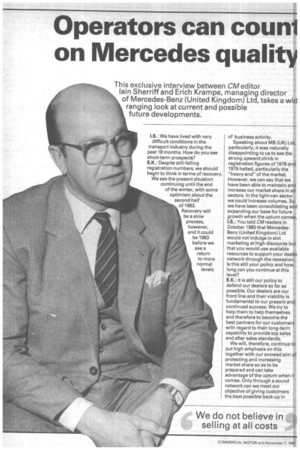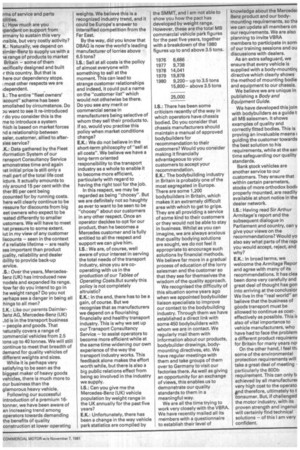Operators can couni on Mercedes quality
Page 20

Page 21

If you've noticed an error in this article please click here to report it so we can fix it.
This exclusive interview between CM editor lain Sherriff and Erich Krampe, managing director of Mercedes-Benz (United Kingdom) Ltd, takes a wid ranging look at current and possible future developments.
I.S.: We have lived with very difficult conditions in the transport industry during the past 18 months. How do you see short-term prospects?
E.K.: Despite still-falling registration numbers, we should begin to think in terms of recovery.
We see the present situation continuing until the end of the winter, with some optimism about the second half of 1982.
Recovery will be a slow process, however, and it could be 1983 before we see a return to more normal levels of business activity.
Speaking about MB (UK) Ltd, particularly, it was naturally disappointing to us to see the strong upward climb in registration figures of 1978 and 1979 halted, particularly the "heavy end" of the market. However, we can say that we have been able to maintain and increase our market share in all sectors. In the light-van sector we could increase volumes. So we have been consolidating and expanding our base for future growth when the upturn comes. I.S.: You told CM readers in October 1980 that MercedesBenz (United Kingdom) Ltd would not indulge in slot marketing at high discounts but that you would use available resources to support your dealer network through the recession. Is this still your policy and how long can you continue at this level?
E.K.: It is still our policy to defend our dealers so far as possible. Our dealers are our front line and their viability is fundamental to our present and continued success. We try to help them to help themselves and therefore to become the best partners for our customers with regard to their long-term capability to provide top sales and after sales standards.
We will, therefore, continue to put high emphasis on this together with our avowed aim of protecting and increasing market share so as to be prepared and can take advantage of the upturn when it comes. Only through a sound network can we meet our objective of giving customers the best possible back-up in rms of service and parts cilities.
How much are you rpendent on support from armany to sustain this very 'risible, but very costly activity? K.: Naturally, we depend on aimler-Benz to supply us with a le range of products to market Britain — some of them )ecifically designed and built this country. But that is here our dependency stops. I most other respects we are 'dependent.
3.: The entire "fleet owners' iscount" scheme has been amolished by circumstance. Do DU want to see it re-introduced r do you consider this is the me to introduce a system .hich is based on market forces hd a relationship between ealer, customer, allied to afterales service?
.K.: Data gathered by the Fleet iformation System of our ransport Consultancy Service emonstrates time and again at initial price is still only a mall part of the total life cost icture. It actually amounts to nly around 15 per cent with the ther 85 per cent being ccounted for by running costs. here will clearly continue to be ressure for discounts from big eet owners who expect to be 'eated differently to smaller ustomers. We will have to meet at pressure to some extent. lut in my view of any customer liscounts — seen in the context if a reliable lifetime — are really ass important than product luality, reliability and dealer ibility to provide back-up 'ervice.
.S.: Over the years, Mercedes3enz (UK) has introduced new nodels and expanded its range. -low far do you intend to go in he weight range? Do you not )erhaps see a danger in being all :hings to all men?
E.K.: Like our parents Daimler3enz AG, Mercedes-Benz (UK) _td is in the transport business — people and goods. That laturally covers a range of :iommercial vehicles from 2.5 Eons up to 40 tonnes. We will still ::;ontinue to meet that breadth of demand for quality vehicles of different weights and sizes.
While it is perhaps very satisfying to be seen as the biggest maker of heavy goods vehicles, there is much more to our business than the glamorous heavy vehicle.
Following our successful introduction of a premium 16tonner, we have been aware of an increasing trend among operators towards demanding the benefits of quality construction at lower operating weights. We believe this is a recognized industry trend, and it could be Europe's answer to intensified competition from the Far East.
By the way, did you know that DBAG is now the world's leading manufacturer of lorries above 6.5 tons?
IS.: Sell at all costs is the policy of almost everyone with something to sell at the moment. This can lead to strange customer relationships and indeed, it could put a name on the "customer list" which would not otherwise be there. Do you see any merit or commercial sense in manufacturers being selective of whom they sell their products to. If so, would you practise this policy when market conditions change?
E.K.: We do not believe in the short-term philosophy of "sell at all costs". We believe we have a long-term oriented responsibility to the transport industry as a whole to enable it to become more efficient, . particularly with regard to having the right tool for the job.
In this respect, we may be regarded as being "choosy". But we are definitely not so haughty as ever to want to be seen to be "choosy" about our customers in any other respect. Once an operator decides to opt for our product, then he becomes a Mercedes customer and is fully entitled to all the respect and support we can give him.
I.S.: We are, of course, well aware of your interest in serving the total needs of the transport industry, since you are cooperating with us in the production of our Tables of Operating Costs.But surely this policy is not completely altruistic?
E.K: In the end, there has to be a gain, of course. But we
recognise that as manufacturers we depend on a flourishing financially and healthy transport industry. This is why we set up our Transport Consultancy Service — to assist operators to become more efficient while at the same time widening our own experience of the way the transport industry works. This feedback alone makes the effort worth while, but there is also a big public relations effect from being so involved in the industry we supply.
I.S.: Can you give me the Mercedes-Benz (UK) vehicle population by weight range in the UK annually for the past five years?
E.K.: Unfortunately, there has been a change in the way vehicle park statistics are compiled by
the SMMT, and I am not able to show you how the pact has developed by weight range. However, these are the total MB commercial vehicle park figures for the past five years, together with a breakdown of the 1980 figures up to and above 3.5 tons.
1976 6,686 1977 9,738 1978 14,041 1979 19,878 1980 9,200— up to 3.5 tons 15,800— above 3.5 tons 25,000 IS.: There has been some criticism recently of the way in which operators have chassis bodied. Do you consider that chassis manufacturers should maintain a manual of approved bodybuilders for recommendation to their customers? Would you consider making it financially advantageous to your customers to accept your recommendation.
E.K.: The bodybuilding industry in Britain is probably one of the most segregated in Europe. There are some 1,200 bodybuilders in Britain, which makes it an extremely difficult area with which to get to grips. They are all providing a service of some kind to their customers or they would not be able to stay in business. Whilst as you can imagine, we are always anxious that quality bodying solutions are sought, we do not feel it appropriate to encourage such solutions by financial methods. We believe far more in a gradual process of education of the lorry salesman and the customer so that they see for themselves the wisdom of the quality approach.
We recognised the difficulty of this situation some years ago when we appointed bodybuilder liaison specialists to improve our contact to the bodybuilding industry. Through them we have established a direct link with some 450 bodybuilders with whom we are in contact. We regularly mail them with information about our products, bodybuilder drawings, bodymounting directives, etc. We have regular meetings with them and take groups of them over to Germany to visit our factories there. As well as giving an opportunity for an exchange of views, this enables us to demonstrate our quality standards to them in a meaningful way.
We are all the time trying to work very closely with the VBRA. We have recently mailed all its members with a questionnaire to establish their level of
knowledge about the Mercedet Benz product and our bodymounting requirements, so tha we can update all members on our requirements. We are also planning to invite VBRA members to participate in som, of our training sessions and ou discussions with dealers.
As an extra safeguard, we ensure that every vehicle is supplied with a body-mountinc directive which clearly shows the method of mounting bodie and equipment to our chassis.
We believe we are unique in publishing a Body and Equipment Guide.
We have developed this join with bodybuilders as a guide t, all MB salesmen. It shows examples of quality and correctly fitted bodies. This is proving an invaluable means guiding the customer towards the best solution to his requirements, while at the san time safeguarding our quality standards.
Bank stock vehicles are another service to our customers. They ensure that within certain parameters, stocks of more orthodox bodir properly mounted, are readily available at short notice in the dealer network.
I.S.: Having read Sir Arthur Armitage's report and the subsequent dialogue in Parliament and country, can y give your views on the recommendations? Would yo also say what parts of the repi you would accept, reject, and why?
E.K.: In broad terms, we welcome the Armitage Repor and agree with many of its recommendations. It has clea been done very carefully and great deal of thought has gon into arriving at the conclusior We live in the "real world" an believe that the business of goods transport must be allowed to continue as costeffectively as possible. This if. also of vital importance to vehicle manufacturers, who have had to face the problem a different product requirerm for Britain for many years no On the other hand, I feel thi some of the environmental protection requirements will take a great deal of meeting particularly the 80Db requirement. This can only b achieved by all manufacturer very high cost to the operato ond therefore, ultimately to t 'consumer. But, if challenged the motor industry, with its proven strength and ingenui will certainly find technical solutions — of this I am very confident.












































